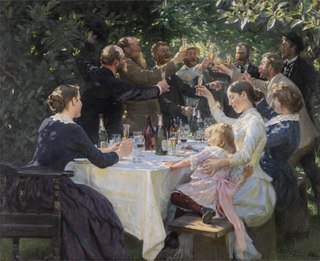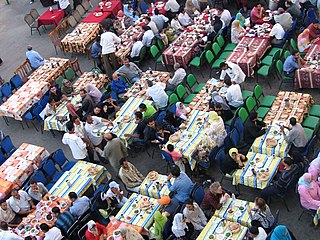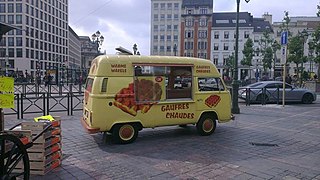
A party is a gathering of people who have been invited by a host for the purposes of socializing, conversation, recreation, or as part of a festival or other commemoration or celebration of a special occasion. A party will often feature food and beverages, and often conversation, music, dancing, or other forms of entertainment.
Brunch is a meal, sometimes accompanied by alcoholic drinks. Brunch is typically served between the hours of 10:00AM - 1:30PM. The meal originated in the British hunt breakfast. The word brunch is a portmanteau of breakfast and lunch. The word originated in England in the late 19th century, and became popular in the United States in the 1930s.
The following outline is provided as an overview of and topical guide to meals:

A bento is the Japanese iteration of a single-portion take-out or home-packed meal, often for lunch. Outside Japan, it is common in other East and Southeast Asian culinary styles, especially within Chinese, Korean, Singaporean cuisines and more, as rice is a common staple food in the region. The term bento is derived from the Chinese term biandang, which means "convenient" or "convenience".

A SIM card is an integrated circuit (IC) intended to securely store the international mobile subscriber identity (IMSI) number and its related key, which are used to identify and authenticate subscribers on mobile telephony devices. Technically the actual physical card is known as a universal integrated circuit card (UICC); this smart card is usually made of PVC with embedded contacts and semiconductors, with the SIM as its primary component. In practise the term "SIM card" refers to the entire unit and not simply the IC.

A pancake is a flat cake, often thin and round, prepared from a starch-based batter that may contain eggs, milk and butter and cooked on a hot surface such as a griddle or frying pan, often frying with oil or butter. It is a type of batter bread. Archaeological evidence suggests that pancakes were probably eaten in prehistoric societies.

A picnic is a meal taken outdoors as part of an excursion, especially in scenic surroundings, such as a park, lakeside, or other place affording an interesting view, or else in conjunction with a public event such as preceding an open-air theater performance, and usually in summer. It is different from other meals because it requires free time to leave home.
Elevenses is a short break taken at around 11:00 a.m. to consume a drink or snack. The names and details vary among countries.
The Worldwide Developers Conference (WWDC) is an information technology conference held annually by Apple Inc. The conference is usually held at Apple Park in California. The event is usually used to showcase new software and technologies in the macOS, iOS, iPadOS, watchOS, and tvOS families as well as other Apple software. WWDC is also an event hosted for third-party software developers that work on apps for iPhones, iPads, Macs, and other Apple devices. Attendees can participate in hands-on labs with Apple engineers and attend in-depth sessions covering a wide variety of topics.

Cha chaan teng, often called a Hong Kong-style cafe or diner in English, is a type of restaurant that originated in Hong Kong. Cha chaan teng are commonly found in Hong Kong, Macau, and parts of Guangdong. Due to the waves of mass migrations from Hong Kong in the 1980s, they are now established in major Chinese communities in Western countries such as Australia, Canada, the United Kingdom, and the United States. Likened to a greasy spoon cafe or an American diner, cha chaan tengs are known for eclectic and affordable menus, which include dishes from Hong Kong cuisine and Hong Kong-style Western cuisine. They draw comparisons to Western cafés due to their casual settings, as well as menus revolving around coffee and tea.

Iftar, also known as futoor, , is the evening meal with which Muslims end their daily Ramadan fast at sunset. They break their fast at the time of the call to prayer (adhan) for the evening prayer. This is their second meal of the day; the daily fast during Ramadan begins immediately after the pre-dawn meal of suhur and continues during the daylight hours, ending with sunset with the evening meal of iftar.

A field ration is a type of prepackaged or canned military ration. Field rations are distinguished from garrison rations by virtue of being designed for minimal preparation in the field, as well as for long shelf life. They contain canned, vacuum-sealed, pre-cooked, or freeze-dried foods, powdered beverage mixes or concentrated food bars. Many field rations contain meat as one of their main courses, but countries such as the United States offer vegetarian options as well. A WWI term, the "iron ration" is a soldier's dry emergency rations. The term MRE is sometimes used synonymously with field ration but it more accurately describes a specific type from the United States. Most armed forces in the world today now field some form of pre-packaged combat ration, often suitably tailored to meet national or regional cuisines.

Assyrian cuisine is the cuisine of the indigenous ethnic Assyrian people, Eastern Aramaic-speaking Syriac Christians of Iraq, northeastern Syria, northwestern Iran and southeastern Turkey. Assyrian cuisine is primarily identical to Iraqi/Mesopotamian cuisine, as well as being very similar to other Middle Eastern and Caucasian cuisines, as well as Greek cuisine, Levantine cuisine, Turkish cuisine, Iranian cuisine, Israeli cuisine, and Armenian cuisine, with most dishes being similar to the cuisines of the area in which those Assyrians live/originate from. It is rich in grains such as barley, meat, tomato, herbs, spices, cheese, and potato as well as herbs, fermented dairy products, and pickles.

Mobile catering is the business of selling prepared food from some sort of vehicle. It is a feature of urban culture in many countries. Mobile catering can be performed using food trucks, trailers, carts and food stands. Many types of foods may be prepared. Mobile catering is also used to provide food to people during times of emergency.

A potluck is a communal gathering where each guest or group contributes a different, often homemade, dish of food to be shared.

The Isle of Wight Festival 2007 was the sixth revived Isle of Wight Festival on the Seaclose Park site in Newport on the Isle of Wight. It took place between 8–10 June 2007. Tickets went on sale at 9am on Thursday 22 February and were sold out by Monday 26 February. It was the first festival since 2003 with no official sponsor.
Farm to School is a program in the United States by Michelle Obama through which schools buy and feature locally produced, farm-fresh foods such as dairy, fruits and vegetables, eggs, honey, meat, and beans on their menus. Schools also incorporate nutrition-based curriculum and provide students with experiential learning opportunities such as farm visits, garden-based learning, and recycling programs. As a result of Farm to School, students have access to fresh, local foods, and farmers have access to new markets through school sales. Farmers are also able to participate in programs designed to educate kids about local food and agriculture.

Pashtun cuisine refers to the cuisine of the Pashtun people and is covered under both Afghan and Pakistani cuisines. It is largely based on meat dishes including mutton, beef, chicken, and fish as well as rice and some other vegetables. Accompanying these staples are dairy products, various nuts, local vegetables, and fresh and dried fruits. Peshawar, Kabul, Kandahar, Quetta and Islamabad are centers of Pashtun cuisine.
The traditional potlatch among Athabaskan peoples was a gathering that combined aspects of competition, peacekeeping and a show of wealth.

A meal is an eating occasion that takes place at a certain time and includes consumption of food. The names used for specific meals in English vary, depending on the speaker's culture, the time of day, or the size of the meal.














